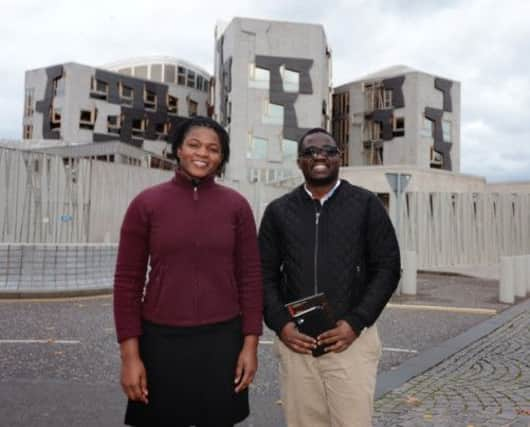African journalists’ lessons from Scotland


Award-winning journalists Chipiliro Kansilanga, 29, and Wonderful Hunga, 27, came to Scotland as part of an initiative launched by Scotland on Sunday, the Scottish Government and the University of Strathclyde to strengthen links between Malawi and Scotland.
They were the first Livingstone Journalism Scholars, named after the 19th-century missionary and explorer, David Livingstone.
Advertisement
Hide AdAdvertisement
Hide AdThe pair described the month-long study tour as “personally challenging” and said they would take home a host of impressions including their surprise at seeing beggars on the streets in such a wealthy country.
They also expressed their delight at seeing MSPs of all parties “ganging up” for the common good on issues such as escalating energy prices.
The scholarship project was created to celebrate the 200th anniversary of the birth of Livingstone. The two journalists, who return home tomorrow, spent time in the Scotland on Sunday office in Edinburgh and attended classes at the University of Strathclyde’s Masters in Investigative Journalism course – one of only two such courses in the UK.
Livingstone is one of the university’s most notable alumni having studied at what was then known as Anderson’s College before setting out on his travels to Africa, and Malawi in particular.
Kansilanga, who works at the Sunday Times in Blantyre, Malawi’s second largest city, which Livingstone named after his Lanarkshire birthplace, said she had been impressed by the way the Scottish press reported legal stories and how the story did not necessarily end when the convicted person was sentenced.
“What I saw was journalists fighting against injustices in court. That is something we don’t have back home because once a judgment is made that tends to be the end of it. But the Scots media follow things up,” she said.
“This personally challenged me and made me realise that I’ve got the power to do things like that too. I was also impressed by how professional journalists here are writing for the good of the public, looking at all sectors of society and not having to ‘cook things up’.”
Hunga, a freelance journalist from Lilongwe, said that in Malawi only the wealthy can afford to appeal sentences handed down by the courts. But his time at the Strathclyde investigative unit had shown him how to begin to tackle this inequality.
Advertisement
Hide AdAdvertisement
Hide Ad“There are so many miscarriages of justice cases in Malawi but only rich people can afford to appeal. An important lesson for me was how in Scotland the media can speak for those who cannot afford to pay,” he said.
Dr Eamonn O’Neill, director of the University of Strathclyde’s MSc in Investigative Journalism, said: “I’ll miss them when they go home. It’s been lovely having them around. There was no ‘first world/developed world’ divide between us. You feel the same thing. You’re aiming for the same goals and everyone in journalism is facing the same ups and downs.”
The pair also visited courts in Edinburgh with John Roberston, director of public affairs at the Faculty of Advocates and a former law correspondent with our sister paper The Scotsman, as well as spending time with political journalists at the Scottish Parliament.
Kansilanga said: “In Malawi the Opposition just want to oppose everything without thinking of how it punishes people on the ground. At the Scottish Parliament I saw MSPs looking at the policy issues and ganging up for the good of ordinary people.”
The Rev Iain May, of South Leith Parish Church, described taking the two journalists on a tour of Leith, showing them both affluence and poverty.
“I think they were quite surprised that Edinburgh being Edinburgh and an affluent city they could come into Leith and see such a very different world. They saw the contrast between a Michelin-starred restaurant like Martin Wishart’s on the Shore and that within six feet away there were people living in poverty and struggling with the effects of the 21st century.”
Education secretary Michael Russell, who helped arrange the journalists’ visit, said: “The study programme being made available to the two Livingstone journalism scholars is an amazing opportunity that has been the result of a partnership between the Scottish Government, Scotland on Sunday and the University of Strathclyde. The study scheme aims to support the development of investigative journalism in Malawi, underpinning the democratic development of the country.
“This is just one of the ways that we are supporting people of Malawi and together celebrating the historic links between our two countries.”